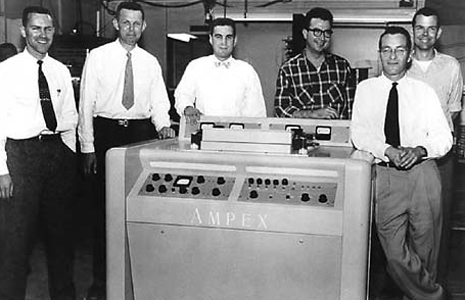The VCR: A Technological Breakthrough
Technology has been rapidly advancing over the last 100 years and it's hard to keep up with each and every important innovation. Today, technology is highly advanced, even over the last 10 years technology has found a way to continue to improve. Just think about mobile phones and how differently they have changed over the last 10 years. But phones are pieces of digital technology and that's not what I will be talking about today.
Today I will be talking about a piece of technology that I think is very important to the advancement of film (and isn't digital!). This being the VCR, also known as the videocassette recorder. So what is a VCR exactly? Well, the VCR is a electro-mechanical device for recording and playing back full-motion audio-visual programming on cassettes containing a magnetic tape. In other words, its primary function is to play and record television programs, and for creating home video recordings Website Source: Whatis.

Image Source: TotalRewind
The first of the VCR's were designed and built in the 1950's, but later became available to the public in the early-to-mid 1970's. The technology rapidly evolved which therefore made the product more widely available for the average consumer as the price was relatively affordable Website Source: TopTen.
In 1956, the Ampex Corporation developed the VRX-1000, which was a video recorder that used a rotating head design to effectively record video and audio on a magnetic tape.

Image Source: History of Recording
Although, because this technology was relatively brand new, it had an initial price tag of $50,000. This was an unrealistic investment for most (clearly). This is equal to about $325,000 today! Website Source: TopTen.

Image Source: Moot
Furthermore, the rotating heads required a knowledgeable operator and only lasted about a few hundred hours. Although, several television networks made the high-priced investment because it meant that networks would no longer have to repeat live broadcasts Website Source: Southtree.
Then in 1965, Sony created the CV-2000 which used a reel-to-reel format and recorded in black and white only. This device was much smaller and much cheaper which made it highly more appealing to the average consumer Website Source: Southtree.

Image Source: Retro Thing

Image Source: DenOfGeek
The VCR was very successful for its time and was very popular up until the mid-to-late 2000's when DVD's came along and made watching film a lot easier, while increasing the quality of display Website Source: Southtree. Now VHS tapes are practically obsolete and VCR players are as well. But for good 30-40 years, VCR and VHS was the bee's knees!

Image Source: 100 Pics
Today I will be talking about a piece of technology that I think is very important to the advancement of film (and isn't digital!). This being the VCR, also known as the videocassette recorder. So what is a VCR exactly? Well, the VCR is a electro-mechanical device for recording and playing back full-motion audio-visual programming on cassettes containing a magnetic tape. In other words, its primary function is to play and record television programs, and for creating home video recordings Website Source: Whatis.
Image Source: TotalRewind
How it was Discovered/Developed
The first of the VCR's were designed and built in the 1950's, but later became available to the public in the early-to-mid 1970's. The technology rapidly evolved which therefore made the product more widely available for the average consumer as the price was relatively affordable Website Source: TopTen.In 1956, the Ampex Corporation developed the VRX-1000, which was a video recorder that used a rotating head design to effectively record video and audio on a magnetic tape.

Image Source: History of Recording
Although, because this technology was relatively brand new, it had an initial price tag of $50,000. This was an unrealistic investment for most (clearly). This is equal to about $325,000 today! Website Source: TopTen.

Image Source: Moot
Furthermore, the rotating heads required a knowledgeable operator and only lasted about a few hundred hours. Although, several television networks made the high-priced investment because it meant that networks would no longer have to repeat live broadcasts Website Source: Southtree.
Then in 1965, Sony created the CV-2000 which used a reel-to-reel format and recorded in black and white only. This device was much smaller and much cheaper which made it highly more appealing to the average consumer Website Source: Southtree.
Image Source: Retro Thing
Then Came the VHS...
VHS (video home system) technology is the most significant type of VCR technology. The technology was introduced in Japan in 1976, and it was introduced in the United States approximately one year later. VHS is the first inexpensive piece of technology that allowed people to watch film in the comfort of their home for the first time. It was massively innovative for its time, and really changed landscape of the film industry Website Source: TopTen.Image Source: DenOfGeek
The VCR was very successful for its time and was very popular up until the mid-to-late 2000's when DVD's came along and made watching film a lot easier, while increasing the quality of display Website Source: Southtree. Now VHS tapes are practically obsolete and VCR players are as well. But for good 30-40 years, VCR and VHS was the bee's knees!

Image Source: 100 Pics
Comments
Post a Comment